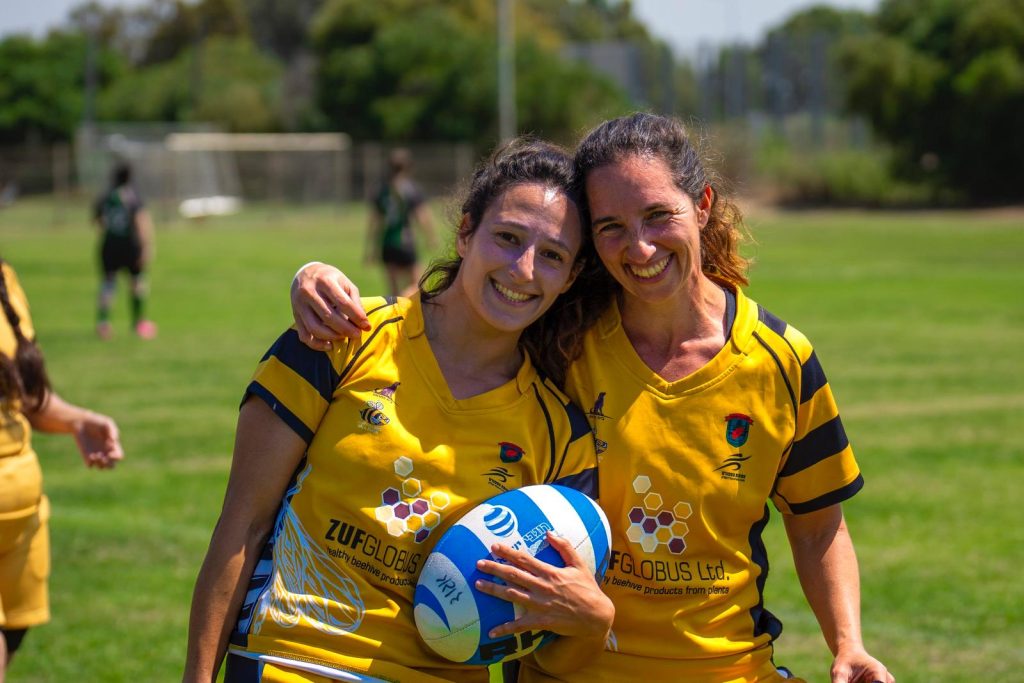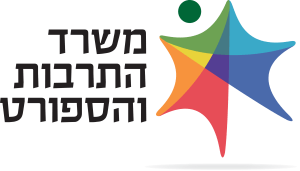Naama Badihi was appointed as the Women’s Programs Coordinator for World Rugby. Naama in addition to being a referee and coach is one of Rugby Israel’s most outstanding players. This coming Friday, she will play her first game of the season with her club, Galil Elyon, a team whose players were evacuated and scattered across the country. Naama lives by the same tenacity that she plays with, ‘This is the piece of life left to us from before the war, the players who were called up for reserve duty, moving to an alternate field in Kibbutz Hulata, and the fact that rugby’s plays such a big place in my life. Naama, who has lost her mother and a brother believes that rugby teaches you strong lessons ‘Falling and getting up and keep playing, because the game goes on.’

Naama Badihi (34) came to rugby somewhat by chance. In fact, she says she was supposed to be a dancer. As one of five siblings, her mother directed her towards dance, although she really wanted to join her brothers in karate. When they came back from their classes overly motivated to wrestle, Naama wasn’t willing to play the role of ‘punching bag’ and fought back. ‘I gave them a fight,’ she recalls with a smile. ‘The need for physicality and wrestling was part of my life, and dance didn’t fulfill that. Rugby opened the door all at once to something physical and aggressive, and my strength combined with speed became assets in this world.’
At the age of 22, she joined a rugby practice for the first time, thanks to a neighbor who played rugby and noticed her passion for sports. That same year, she was accepted into the Israel national team. ‘The joke on the team was that I was born in 1990; I was really the baby of the team. Today, when I think about it, I realize it was super late.’

She began playing in Jerusalem, moved to Tel Aviv, and after meeting her partner, moved to the north, where she played for the Upper Galilee Bees and later became the team’s coach.
The team from the north had every reason this year to disband and not register for the league, but instead, the team became almost the only haven of sanity for the players who were evacuated from their homes. ‘It may be the only memory and piece of life we had from before the war,’ Naama explains. ‘We held a training camp at Wingate; players came from the Dead Sea, Neot Smadar near Eilat, and the north. It has always been our refuge, a way to disconnect from life and do something different. A very supportive and strong social group formed. When I arrive, I am not Yaara’s mother or Elad’s wife—I am a coach and a rugby player. I am very focused in those moments, and I see the same focus in my girls.’

‘When I come to the rugby field, I am not Yaara’s mother or Elad’s wife—I am a coach and a rugby player. I am very focused in those moments, and I see the same focus in my players as well.’

After a break of almost two months, you’ve returned to training twice a week.
Naama: “That’s right. We looked for a field in a location that would be convenient for most players, thankfully, we found one in Kibbutz Hulata, where they collaborated with us. The club decided to invest its resources to install six lighting poles so that we could play in the evening. It was a decision made with a heavy heart, because before the war, we had invested a lot of money in our field in Kibbutz Dan. But we understood that if we didn’t do it, there would be no Upper Galilee rugby club in any form.”
How did the players maintain their fitness over the past year?
Naama: “We did fitness training on Zoom; COVID prepared us for this,” she laughs. “I sent the players fitness workouts they could do at home. Each one had to take responsibility for her body—not to be toned, but so the body would be ready for rugby games. I encouraged those who could to attend fitness sessions and lift weights. In touch rugby sevens, while contact is less frequent, the high speeds mean that when there is contact at high speed, muscle mass is needed to protect the joints.”
This past year has been a challenging rollercoaster for her. As mentioned, she was evacuated from her home with her family due to the war, returned to refereeing games, was appointed as the Women’s Programs Coordinator for World Rugby, and, after completing her master’s degree in hydrogeology, is starting to work at Tel-Hai College. ‘I’m not into energy conservation,’ she says with a smile and adds, ‘I love doing this and that and that. If I enjoy all these fields, why choose?’
Do you also have players who were called up for reserve duty?
Naama: “That’s right. We have Perach Itiel and Orit Katz, who were called up, and whenever possible, they come to practices. Both are in command positions and show up in full uniform. They are both amazing women and an integral part of the team. We really appreciate what they’re doing.”

Tell us a bit about your new role as the Women’s Programs Coordinator.
Naama: “The organization places great importance on getting more girls involved in rugby. The goal is to reach those who don’t know the sport at all through meet-ups and training sessions. Right now, we’re starting in Yizrael and Haifa, with ten sessions where we also address everything the girls experience at this stage in their lives—the whole issue of femininity and adolescence. The role itself is a statement; Boni (Manor-Gottfried, the CEO of the organization) is very driven to promote girls and women. She brings her knowledge and experience, and I bring it down to the field.”
WORLD RUGBY wants to spread the message of rugby among girls and women. They understand that there is a large audience that hasn’t really been invested in until now and is just as relevant as men and youth.
The project is currently set for one year. Once more girls are exposed to rugby and join afternoon teams, we can expand the reach and establish a girls’ league. From there, the national team will grow, there will be more funding, and more achievements.


WORLD RUGBY wants to spread the message of rugby among girls and women. They understand that there is a large audience that hasn’t really been invested in until now and is just as relevant as men and youth.
When you approach the girls and tell them about rugby, how do they react?
Naama: “First of all, you should see the expressions of surprise I get when I say I’m a rugby player. We live in a very stereotypical and formulaic world. In our daily lives, we don’t look like rugby players according to the Israeli stereotype. Each of us comes to practice from home, work, or studies, with our makeup, ponytail, and work attire. But when practice starts, we know how to hit the grass, scrape ourselves, sweat, and be just as strong as the guys.”
“When I was a girl, I had to downplay my strong shoulders, this idea that being a girl means you have to be less than the boys. What happens is that girls limit themselves. I could have ‘beaten’ a lot of boys in various running races or arm wrestling contests, but I didn’t do it.”

“In our daily lives, we don’t look like rugby players according to the Israeli stereotype. Each of us comes to practice from home, work, or studies, with her makeup, ponytail, and outfit. But when practice starts, we know how to hit the grass, scrape ourselves, sweat, and be just as strong as the men.”
Naama adds that the mental barrier doesn’t end with gender but extends to a sports culture that lags behind other Western countries. “I do outreach activities in schools and talk to students. What’s the least favorite class? Physical education. Students find every excuse not to participate. And when girls play with a ball, what game do they play? Dodgeball, meaning they’re learning to avoid the ball. There are deep-rooted perceptions here that need to be worked on from a young age, when the body is flexible, learning is quick, and training comes instinctively.”

“What’s the least favorite class for students in school? Physical education. They find every excuse not to participate. And when girls play with a ball, what game do they play? Dodgeball, meaning they’re learning to avoid the ball. There are deep-rooted perceptions here that need to be addressed from a young age.”
You also didn’t start at age 16, and here you are on the Israeli national team and one of the best players in the country.
Naama: “I started at 22, but I only became really good around age 30. I didn’t have the foundation, the history of being a rugby player and understanding the meaning and importance of growing in the sport. I always wanted to play abroad and was very close to doing it two years ago. I love my life, but it will always tug at my heart. I know what rugby has given me in life—I lost a brother, and my mother also passed away. In rugby, you learn to be strong and to overcome. It’s the ultimate analogy for life: falling and getting up. In rugby, you learn that literally, because the game doesn’t end.”
“I meet many girls, and in every school, I see at least one girl with a sparkle in her eyes when I talk about rugby. I wish that everywhere I go, there would be a girls’ team within driving distance that she could join and see how it helps her grow as a girl and a woman. Rugby has given me so much in life, and I’m sure there are many girls who would connect with it.”
“I lost a brother, and my mother also passed away. In rugby, you learn to be strong and to overcome. It’s the ultimate analogy for life: falling and getting up. In rugby, you learn that literally, because the game doesn’t end.”


Let’s dive into the upcoming season—it all kicks off this Friday.
Naama: “This year, due to the war, there will be six teams. Tel Aviv is a stable team that has always maintained a good level. Haifa has strengthened with experienced players, and I expect them to have a good season. Jerusalem is a historic club where I started; Hadarim and the Owls of Rehovot/Rishon are solid teams, and I hope they can recruit more players and get stronger. My team, Upper Galilee, comes in with the most players who just want to have fun. This year, the tournament will be diverse, with some tag games and some sevens. Over the past three years, I initiated training camps for 10s and 15s, hoping that one day, after the war, it will happen in the league.”










